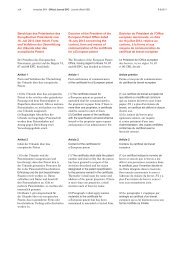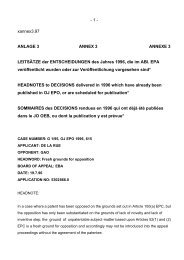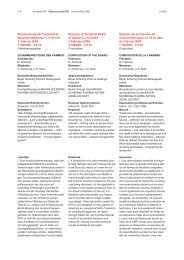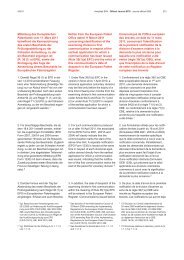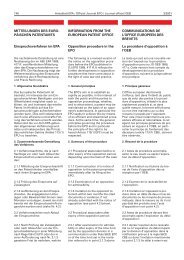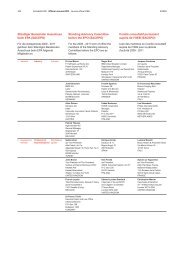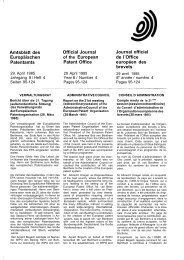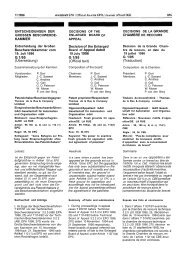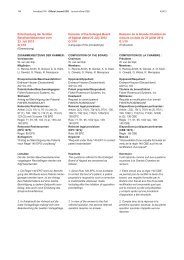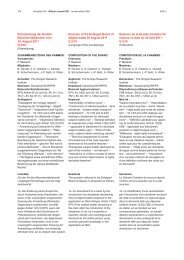Sonderausgabe 1 - European Patent Office
Sonderausgabe 1 - European Patent Office
Sonderausgabe 1 - European Patent Office
Create successful ePaper yourself
Turn your PDF publications into a flip-book with our unique Google optimized e-Paper software.
2007 <strong>Sonderausgabe</strong> Nr. 1 ABl. EPA / Special edition No. 1 OJ EPO / Edition spéciale n° 1 JO OEB 187<br />
(2) Geht die europäische <strong>Patent</strong>anmeldung<br />
auf mehrere Personen über und<br />
haben diese Personen keinen gemeinsamen<br />
Vertreter bezeichnet, so ist<br />
Absatz 1 entsprechend anzuwenden. Ist<br />
eine entsprechende Anwendung nicht<br />
möglich, so fordert das Europäische<br />
<strong>Patent</strong>amt die genannten Personen auf,<br />
innerhalb einer zu bestimmenden Frist<br />
einen gemeinsamen Vertreter zu<br />
bestellen. Wird dieser Aufforderung nicht<br />
entsprochen, so bestimmt das Europäische<br />
<strong>Patent</strong>amt den gemeinsamen<br />
Vertreter.<br />
Regel 152<br />
Vollmacht<br />
(1) Der Präsident des Europäischen<br />
<strong>Patent</strong>amts bestimmt, in welchen Fällen<br />
die Vertreter vor dem Europäischen<br />
<strong>Patent</strong>amt eine unterzeichnete Vollmacht<br />
einzureichen haben.<br />
(2) Versäumt es ein Vertreter, eine<br />
solche Vollmacht einzureichen, so<br />
fordert ihn das Europäische <strong>Patent</strong>amt<br />
auf, dies innerhalb einer zu bestimmenden<br />
Frist nachzuholen. Die Vollmacht<br />
kann sich auf eine oder mehrere<br />
europäische <strong>Patent</strong>anmeldungen oder<br />
europäische <strong>Patent</strong>e erstrecken und ist<br />
in der entsprechenden Stückzahl einzureichen.<br />
(3) Ist den Erfordernissen des Artikels<br />
133 Absatz 2 nicht entsprochen, so<br />
wird für die Bestellung eines Vertreters<br />
und die Einreichung der Vollmacht<br />
dieselbe Frist gesetzt.<br />
(4) Die Beteiligten können allgemeine<br />
Vollmachten einreichen, die einen<br />
Vertreter zur Vertretung in allen <strong>Patent</strong>angelegenheiten<br />
bevollmächtigen. Die<br />
allgemeine Vollmacht braucht nur in<br />
einem Stück eingereicht zu werden.<br />
(5) Der Präsident des Europäischen<br />
<strong>Patent</strong>amts kann Form und Inhalt<br />
a) einer Vollmacht, die die Vertretung<br />
von Personen im Sinne des Artikels 133<br />
Absatz 2 betrifft, und<br />
b) einer allgemeinen Vollmacht<br />
bestimmen.<br />
(6) Wird eine vorgeschriebene Vollmacht<br />
nicht rechtzeitig eingereicht, so gelten<br />
unbeschadet anderer in diesem Übereinkommen<br />
vorgesehener Rechtsfolgen<br />
die Handlungen des Vertreters mit<br />
Ausnahme der Einreichung einer europäischen<br />
<strong>Patent</strong>anmeldung als nicht<br />
erfolgt.<br />
(2) If the <strong>European</strong> patent application is<br />
transferred to more than one person,<br />
and such persons have not appointed a<br />
common representative, paragraph 1<br />
shall apply mutatis mutandis. Ifsuch<br />
application is not possible, the <strong>European</strong><br />
<strong>Patent</strong> <strong>Office</strong> shall invite such persons to<br />
appoint a common representative within<br />
aperiodtobespecified.Ifthisinvitation<br />
is not complied with, the <strong>European</strong><br />
<strong>Patent</strong> <strong>Office</strong> shall appoint the common<br />
representative.<br />
Rule 152<br />
Authorisations<br />
(1) The President of the <strong>European</strong><br />
<strong>Patent</strong> <strong>Office</strong> shall determine the cases<br />
in which a signed authorisation shall be<br />
filed by representatives acting before the<br />
<strong>European</strong> <strong>Patent</strong> <strong>Office</strong>.<br />
(2) Where a representative fails to file<br />
such an authorisation, the <strong>European</strong><br />
<strong>Patent</strong> <strong>Office</strong> shall invite him to do so<br />
within a period to be specified. The<br />
authorisation may cover one or more<br />
<strong>European</strong> patent applications or<br />
<strong>European</strong> patents and shall be filed in<br />
the corresponding number of copies.<br />
(3) Where the requirements of<br />
Article 133, paragraph 2, have not<br />
been satisfied, the same period shall<br />
be specified for the appointment of a<br />
representative and the filing of the<br />
authorisation.<br />
(4) A general authorisation may be filed<br />
enabling a representative to act in<br />
respect of all the patent transactions of a<br />
party. A single copy shall suffice.<br />
(5) The President of the <strong>European</strong><br />
<strong>Patent</strong> <strong>Office</strong> may determine the form<br />
and content of:<br />
(a) an authorisation relating to the representation<br />
of persons under Article 133,<br />
paragraph 2;<br />
(b) a general authorisation.<br />
(6) If a required authorisation is not filed<br />
in due time, any procedural steps taken<br />
by the representative, other than the<br />
filing of a <strong>European</strong> patent application,<br />
shall be deemed not to have been taken,<br />
without prejudice to any other legal<br />
consequences provided for by this<br />
Convention.<br />
(2) Si la demande de brevet européen<br />
est transférée à plusieurs personnes et<br />
si ces personnes n’ont pas désigné de<br />
représentant commun, le paragraphe 1<br />
est applicable. Si son application est<br />
impossible, l’<strong>Office</strong> européen des<br />
brevets invite les ayants droit à désigner<br />
ce représentant commun dans un délai<br />
qu’il leur impartit. S’il n’est pas déféré à<br />
cette invitation, l’<strong>Office</strong> européen des<br />
brevets désigne luimême le représentant<br />
commun.<br />
Règle 152<br />
Pouvoir<br />
(1) Le Président de l’<strong>Office</strong> européen<br />
des brevets détermine les cas dans<br />
lesquels les mandataires agissant<br />
devant l’<strong>Office</strong> européen des brevets<br />
doivent déposer un pouvoir signé.<br />
(2) Lorsqu’un mandataire ne dépose pas<br />
un tel pouvoir, l’<strong>Office</strong> européen des<br />
brevets l’invite à y remédier dans un<br />
délai qu’il lui impartit. Si le pouvoir est<br />
donné pour plusieurs demandes de<br />
brevet européen ou pour plusieurs<br />
brevets européens, il doit en être fourni<br />
un nombre correspondant d’exemplaires.<br />
(3) S’il n’est pas satisfait aux exigences<br />
de l’article 133, paragraphe 2, le même<br />
délai est imparti pour la constitution d’un<br />
mandataire et pour le dépôt du pouvoir.<br />
(4) Toute partie peut donner un pouvoir<br />
général autorisant un mandataire à la<br />
représenter pour toutes les affaires de<br />
brevet la concernant. Ce pouvoir peut<br />
n’être déposé qu’en un exemplaire.<br />
(5) Le Président de l’<strong>Office</strong> européen<br />
des brevets peut prescrire la forme et le<br />
contenu :<br />
a) du pouvoir déposé pour représenter<br />
une des personnes visées à l’article 133,<br />
paragraphe 2,<br />
b) du pouvoir général.<br />
(6) Si le pouvoir requis n’est pas déposé<br />
dans les délais, les actes accomplis par<br />
le mandataire, à l’exception du dépôt<br />
d’une demande de brevet européen,<br />
sont réputés non avenus, sans préjudice<br />
d’autres conséquences juridiques<br />
prévues par la présente convention.



